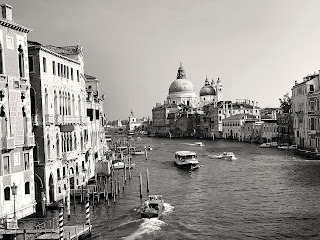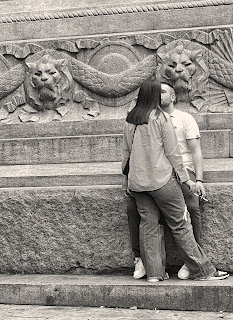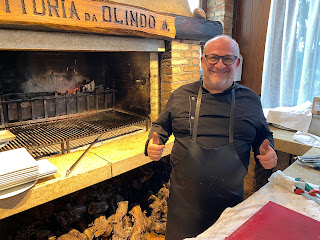 |
| Welcome to the Hitching Post |
 |
| Framed |
I crossed paths with Kristeena Smith for the first time last
summer at the Taos Roundup, a western music extravaganza put on by Kristeena
and other merchants on Paseo del Pueblo Norte in Taos. I was photographing the festivities, mostly the crowd, when
she greeted our friend, Bob Dempsey. Bob, of course, knew Kristeena since he’s
the most connected human in the western world. But that’s a story for another time.
 |
| Working Hands |
 |
| Headshot One |
 |
| Headshot Two |
It was a brief encounter that led in two directions, one to
have her cut my hair. She was named the Best Barber in Taos for 2023. And two,
to take her portrait. Early in our shoot I told her that I favor headshots and prefer open shade like the ones in the doorway to her shop or a single softbox used for the rest. Both provide a soft caressing light. What I know about Kristeena is cobbled from what
Bob has told me, what I heard while she gave me the best haircut in recent times and during our conversation when I shot her portrait. From Bob I learned that she's in her forties, dropped out of high school,
later got her GED and is the single parent of a seventeen year old daughter.
Kristeena filled in some of the blanks for me. She grew up in Redondo
Beach, a town I know well. I once lived two beach towns north. She left home when she was 16 and worked in the hospitality
industry for many years as a server, bartender, and manager. She told me she made the most money in a dive bar. I can relate. I spent the most money in dive bars. Then at some
juncture, she went to barber school where she learned nothing except
that she was the only student not afraid to use a straight razor. The fearful ones were all guys. A barbershop
chain with a comprehensive training program is where she really learned to barber. She cut
hair in or near Redondo Beach and for five more years in wealthy Walnut Creek in Contra Costa
County. She told me she couldn’t afford to live there. She relocated
to Taos three years ago and opened the Hitching Post Shave Company
which earned its Best Barbershop accolades this year. I recalled to Kristeena that ten
years ago I wrote about my friend and barber the late Juma Archuletta whom I called The Good
Cutter. When Kristeena gave me a most au courant haircut, Bob Dempsey’s French descriptor, she joined Juma in the pantheon of great barbers I have known.
My knowledge of Kristeena is completely superficial.
And the arc of her story is drawn from my alleged memory. If the facts are sketchy, the gist, I think, is true.
She is self-made, self-possessed, entrepreneurial,
and brimming with style. And she has a clever game plan that will free her up to enjoy her horses sooner rather than later. I commend her for having a plan and sticking to it. That's rare in itself. In an earlier less enlightened time we’d
have called her a helluva broad.
























































